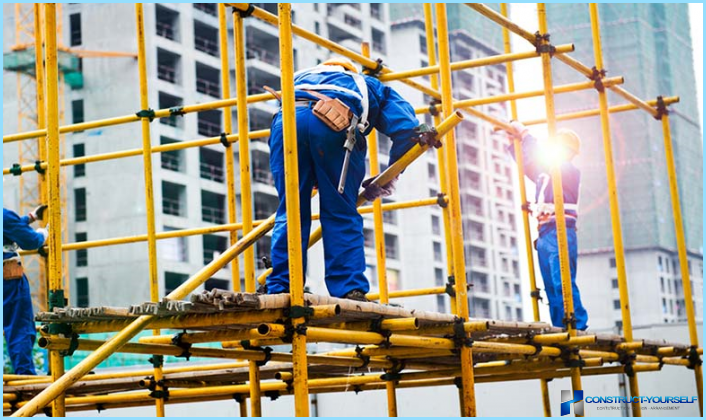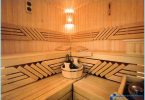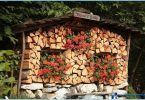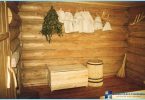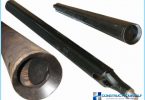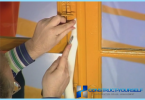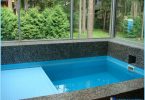The contents
To build a house or office building is not enough, you need to like the client and the tenants. Therefore, the lion’s share of time in the process of finishing the box construction has to be given to external design of the facade. In the case of the reconstruction or restoration work to do without scaffolding impossible. The construction had got rid of the downed improvised structures made of planks and logs, from which came the name.
Construction company widely used reusable frame construction scaffolding, as a more safe and reliable. For small jobs you can use the wooden self-assembled scaffolding, constructed of wooden beams and slabs. The safety of such structures can provide only a small height, about a couple of stories. Therefore, in the present construction a wooden structure used mainly for domestic work in the room.
What are scaffolding ↑
Modern industrial production methods have allowed to create a large number of system scaffolding. The most frequently used scaffolds have a modular design and is based on the use of a large number of universal stands, locks, retainers and shields, allowing to obtain the required total height of the structure and dimensions of the working area of construction.
All modern types and types of scaffolds have a modular basis. In addition, for Assembly and installation is not used a specialized tool or tools fasteners.
There are about a dozen kinds of scaffolding most often in construction, use:
- Multi-sectional modular schemes using different options of mounting locks – clamps, pins or spacers wedges;
- The suspended scaffolding system, made in the form of a tubular frame, fixed console on the power elements of the building
- Cup system that allows you to quickly and effortlessly deploy the scaffolding for installation or repairs;
- Towers (tours) mobile.
The suspended scaffolding system to allow you to work at very high altitude and quickly change its location according to established guidelines. Thanks to a system of levers and balance weights, it was possible to refuse the installation of supports on the territory adjacent to the walls of the facade.
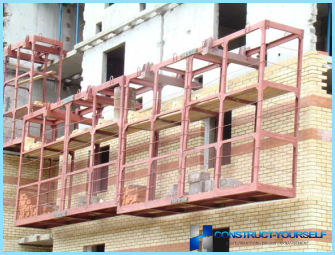
The other systems are basically a frame structure, resting on the facade of the building and site along the tape Foundation.
The basic principles of scaffolding ↑
Almost all types of scaffolding based on the use of several standard products:
- Longitudinal (horizontal) steel tubular beam with attachment elements at the ends;
- Standard vertical support element is a steel pipe with a diameter of 2-2. 5 inches with locks securing horizontal and diagonal beams.
- Locking devices of various designs: in the form of paired clamps, wedges, bolts, standard couplings.
- Lifting ladders and support boards, or decking for scaffolding.
- Auxiliary reference screw jacks and support stands – shoes.
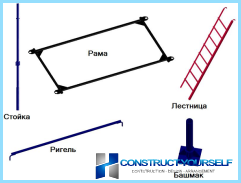
The choice of design must be approached responsibly, since the correct choice depends not only on the ability of high-quality and quick construction work, but also the safety of people working on them. As a rule, Assembly of scaffolding and maintaining their health by a special team headed by the wizard.
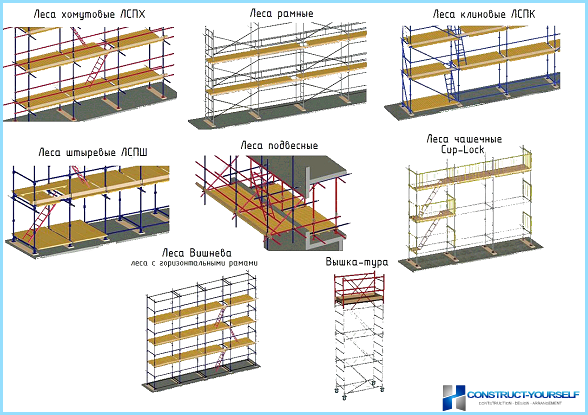
To make the right choice, you need to perform, for which objects it is supposed to use them. This necessarily takes into account the height of the object, its geometric configuration, the maximum load on the frame that occur in the process.
Professional construction tubular scaffolding are made in industrial conditions from normal steel and which allows to lift people and materials to a great height, usually up to 40m.
Scaffolding features:
- The type used in constructional elements and method of their connection;
- For carrying capacity – the maximum height of a structure and the perceived payload;
- the price of the standard kit.
Wedge, clamp, pin and frame options ↑
Wedge woods used in the construction, finishing and repair of high-rise buildings or other structures having a height up to 100 meters. The elements are fixed by means of wedges. The design is composed of metal tubes, as in the children’s designer.
The vertical elements have round flanges with holes, welded on the horizontal holders that have with hole and wedge. The diagonal element of the pipe at the ends is tapered and has a swivel mount with a wedge. Wedge woods have a large enough capacity, they can accommodate not only builders, but also the necessary tools and even construction equipment.
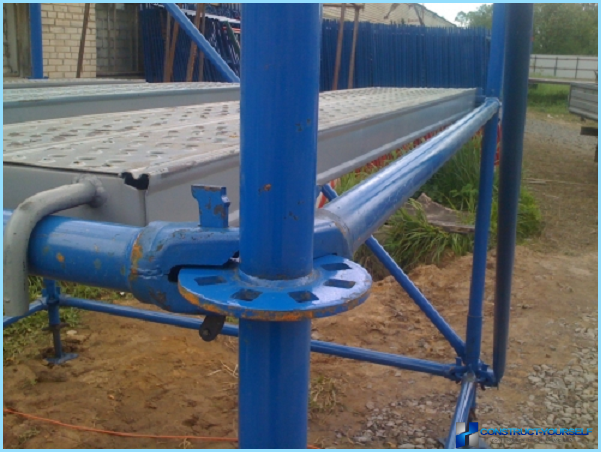
In comparison with other designs forest belts are not load on the building, so they prefer to use in restoration work. Can be used for buildings and constructions of various geometric shapes. For that, you need to use a swivel clamps
. 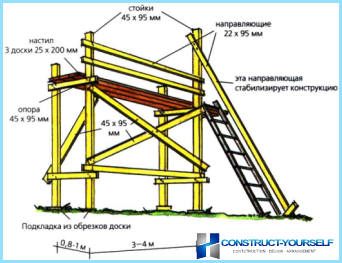
They can also be used for mobile Assembly halls, concert halls, spectator stands, for internal furnish or repair of the high halls (concert, theatre, etc.).
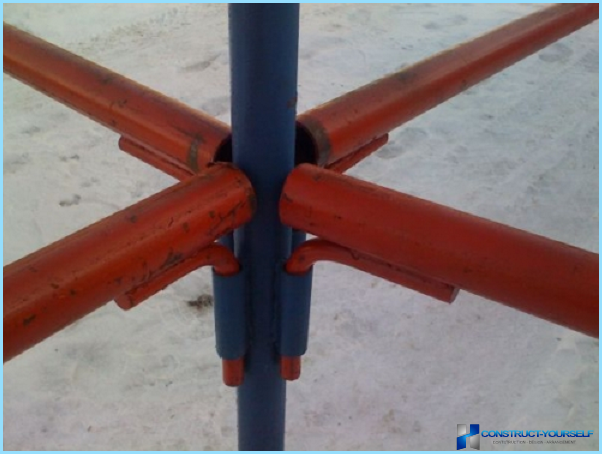
Pin forest can be used for finishing and repair of facades of buildings, at a height of 40 meters. Also pin systems are suitable for plastering of buildings. The advantages of this design include ease of Assembly and disassembly, as well as the fact that they can be used for facades of any geometrical shapes and patterns, including balconies, niches, arches, overhangs, and other elements.
Frame scaffolding are quick Assembly, low price and relatively low weight. The disadvantage is the lack of rigidity during use. To provide the necessary rigidity for the frames began to use a round pipe, floating reducers replaced by a rigidly welded, the diagonal as close to the ends of the frames.
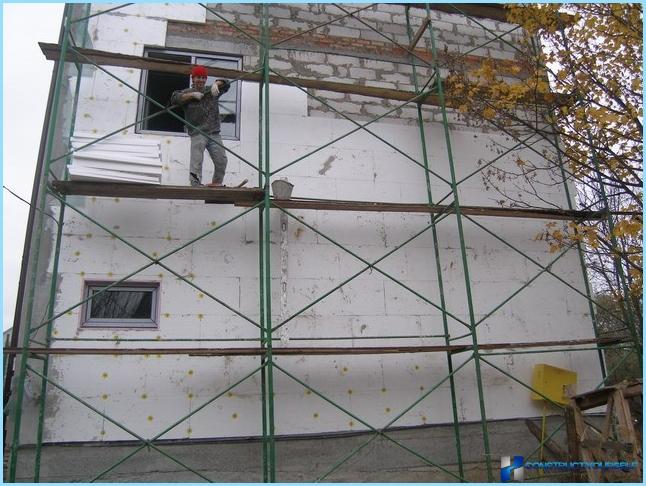
To increase stiffness use the diagonal and horizontal bundles, the walls are attached to horizontal communication, the outside of the scaffolding diagonal connections are established in a staggered manner and alternate with the horizontal. Maximum load allowed 200 kg per sq. m. forest Height can be up to 100m.
Clamp scaffolding can be used as a universal, as they can easily pick up the necessary sizes of layers, to reduce or increase the size of the working area. It is convenient to use in the repair of buildings of irregular shape. Their height can reach 100 meters, the maximum load in the standard version – up to 250kg per sq. m., in the Lite version up to 200 kg per sq m.
Fixing elements in such forests do with clamps, rotary and fixed. Using the rotary clamps the diagonals can be connected with the upright supports at different angles. Deaf (fixed) clamps attached to vertical and horizontal beams at right angles. Clamps for scaffolding are tightened using a pair of screw-nut.
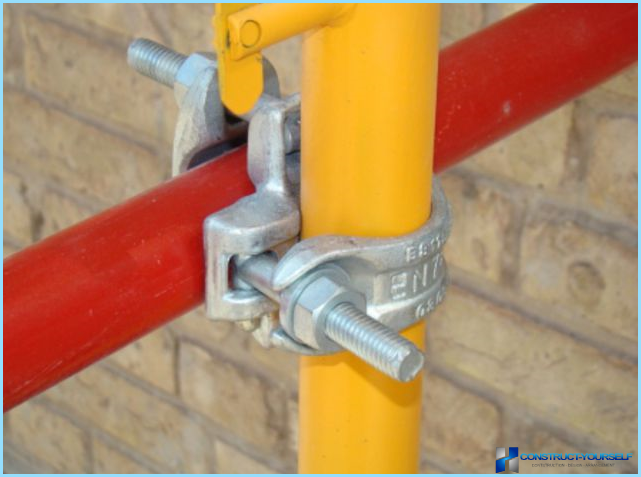
Clamp forests are additionally attached to the wall of the building zamarstinivska tubes, which are also included in the scaffolds. If necessary, clamp the forests, you can change the height of stairs, step runs and stands.
Cup system and construction of derricks ↑
Cup system got its name because of the unusual shape of the nut retainer of the castle, having the form of a Cup. The advantage of the scheme is the possibility of very quick installation. Apply to urgent work of high rise build scenes or scenery in the variety and concert performances in the open air.
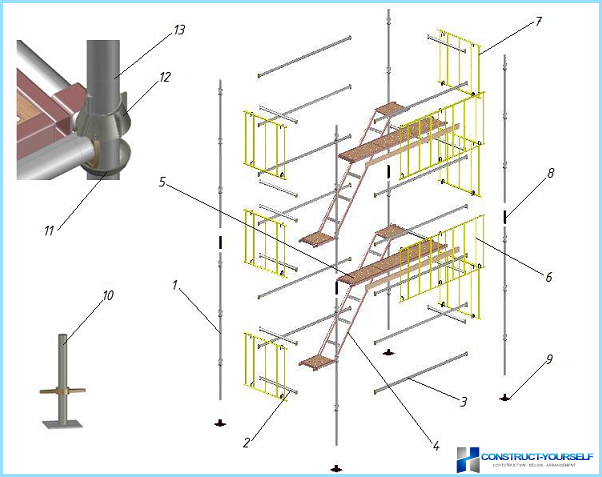
Construction tower-tour used for low-rise works with the facade of the building, abundance of large number decor, projections, turrets, and balconies. Design is a frame tower resting on the jacks and wheels. To install to a new place of work the HSE must be removed from the Jack supports and a chain or cable winch to roll on the levelled platform on a new point. Sometimes these rigs are additionally equipped with a lifting mechanism.
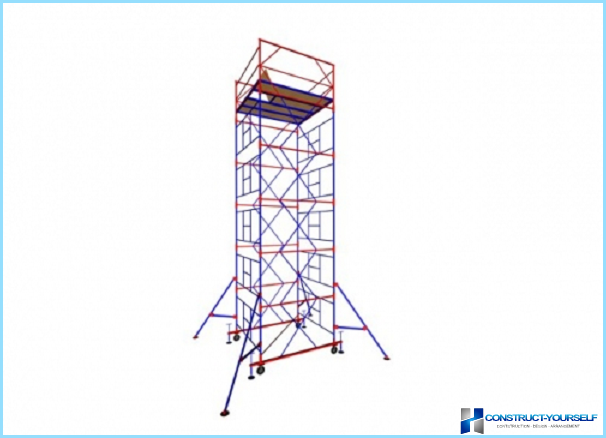
For the safety of people who may be near the construction site, and the builders used the front mesh for scaffolding, pulls on the whole structure on the outside of the object. It will prevent a fall from scaffolding, various construction debris, tools and other items which can hurt nearby pedestrians, cars. On the other hand, mounting the net protects the workers are on the scaffolding, the wind and blinding light, and will create more comfortable conditions for work.
Installation of scaffolding required to carry out under the scheme of routing, which specifies the sequence of work. Proper Assembly is the key to safe work on them.

